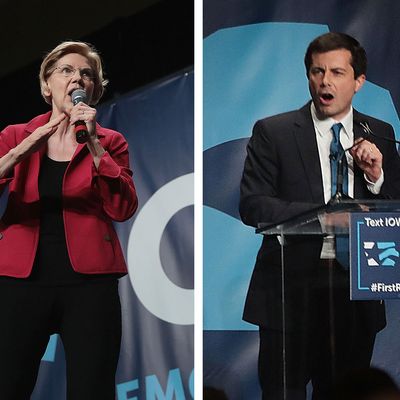
When Ann Selzer measures the opinions of Iowa voters, the whole political world listens. So her latest gold-standard Iowa Poll for the Des Moines Register, CNN, and Mediacom will draw a lot of attention as an early sign of how the 2020 Democratic caucuses in her state are beginning to shape up.
A previous Selzer poll conducted in March, well before Joe Biden’s formal announcement of his candidacy, showed the former veep and 2016 Iowa runner-up Bernie Sanders very nearly tied at 27 and 25 points, respectively. No one else was in double digits in support, though Elizabeth Warren was close at 9 percent.
The new survey shows Biden dropping to 24 percent and Sanders to 16 percent, with Warren (15 percent) and Pete Buttigieg (14 percent) close behind. What jumps out the most, other than the decline in support for the front-runners, are the different approaches that seem to be working for these candidates in Iowa. Warren has what is generally considered the best field organization in a state where that traditionally matters most. Mayor Pete has virtually no field organization, though he has drawn big crowds in the state when he’s campaigned there. The candidate who is second only to Warren in building an old-school field organization in Iowa, Cory Booker, barely registers in the new poll; he’s at one percent, down there with John Delaney, Tulsi Gabbard, and Andrew Yang. Beto O’Rourke, who has some big-name in-state talent backing him, and who looked pretty good in the March Iowa Poll, is down to 2 percent.
The internals of the new Selzer poll show some nuances that top-line numbers miss. Asked about candidates they are “actively considering,” over a third of likely caucusgoers mention Booker, and nearly that many mention O’Rourke and Kamala Harris (who is in fifth place in the poll at 7 percent). So those candidates may have some untapped potential.
As for Joe Biden, he may have a bit of an enthusiasm problem, which is not a great sign in a caucus state:
Among those who list Biden as their first choice for president, 29% say they are “extremely enthusiastic” about their choice. Among all those who name another candidate as their first choice for president, that number is substantially higher (39%).
Bernie Sanders, moreover, is showing some weakness in intensity of support in a state where he is well-known and has a host of volunteers working to replicate his strong 2016 showing:
The results also surface signs of weakness for Sanders. He does better with those less committed to caucusing (20% among probable caucusgoers) than those who definitely plan to participate (14%).
This poll has one new wrinkle that reflects a change in Iowa caucus procedures: separate samples of those who plan to caucus in person, which until this year was the exclusive way to participate, and those who will exercise the option of the state Democratic Party’s new “virtual caucus,” conducted much like early voting before the main event. But in-person participants will still be weighted over the virtual variety at a nine-to-one ratio, so there remains no substitute for careful attention to the state.
One possibility the Register’s write-up of the poll raises is that the vast field is now sorting itself into “tiers,” with the five candidates polling over 7 percent separating themselves quickly from the herd:
“We’re starting to see the people who are planning to caucus start to solidify,” said J. Ann Selzer, president of the Des Moines-based Selzer & Co., which conducted the poll. “There’s a lot more commitment than we normally see this early. And some of these candidates who’ve been under the radar start to surface and compete with Joe Biden.”
This means also-rans like Booker and O’Rourke better get it in gear pretty soon, lest they be dismissed as nonviable. It’s worth remembering as well that in Iowa as elsewhere a candidate will need 15 percent in any delegate-granting jurisdiction to win any at all.
Some candidates aren’t making any mark at all in Iowa so far. The latest comic episode in the much-maligned campaign of New York mayor Bill de Blasio comes from Selzer’s poll:
Two candidates — New York City Mayor Bill de Blasio and Miramar, Florida, Mayor Wayne Messam — were not listed by a single poll respondent as either first or second choice for president.
Hizzoner responded that the poll, after all, just indicated the preferences of “600 Iowans” (the sample for the caucus survey). Dismissing any Iowan is a really bad idea if you want to compete in that state. They are nothing if not very conscious of their role in the presidential nominating process.






























